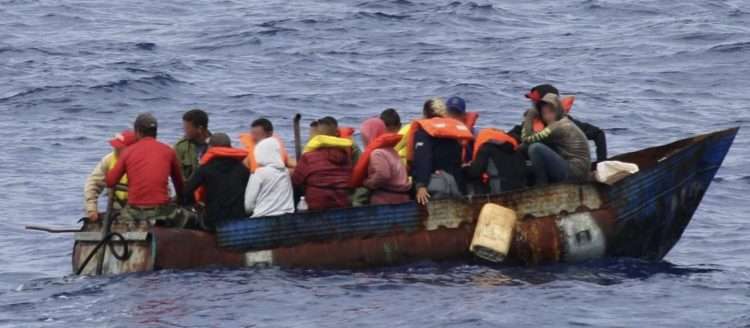The United States Coast Guard repatriated a group of 94 Cuban rafters this Saturday as a result of four interdictions. The figure is added to the 270 repatriated on Tuesday and reported yesterday.
The new group of illegal migrants, whose sex and age are not specified, was captured between Tuesday and Wednesday at points near Elbow Cay and Cayo Sal, in the Bahamas; as well as Islamorada and Crocker Reef, Florida.
#Breaking #USCGC Issac Mayo and Paul Clarks' crews repatriated 270 Cubans to @USEmbCuba, Tuesday.
"Folks illegally migrating to the U.S. by sea will not be allowed to stay. Choose a safe and legal means of coming to the U.S." said Lt. Matt Miller,
Read: https://t.co/Ce83U8e7Vo pic.twitter.com/dv7MWC1vhJ
— USCGSoutheast (@USCGSoutheast) October 21, 2022
On Tuesday, the Coast Guard had made another trip to Havana to return 270 people trying to reach U.S. territory. That amount corresponds to 20 arrests.
Among the latter was a man who was sailing aboard a surfboard. He was sighted near Key West.
The members of the second group were captured between Thursday the 13th and Tuesday the 18th. The vessels in which they were traveling were fishing boats, rustic and sailing boats, some overloaded.
The authorities once again recall the danger of migrating in this way and that from October 1 to date they have already captured a total of 921 Cubans. The figure for fiscal year 2022, which ended on that day, closed at 6,182.
The island is going through a growing wave of migration, multiplied not only by the number of rafters who venture across the Straits of Florida, but also by those who make the journey overland through Central America to the border of Mexico and the United States.
The U.S. Department of Customs and Border Protection (CBP) has registered the arrival of 224,607 Cubans in that country from October 2021 to September 2022, according to reports from the Spanish EFE news agency.
The number of rafters exceeds the largest flow of Cubans so far, reported in 1980, when 125,000 people left through the port of Mariel in just seven months.
Havana points to the Cuban Adjustment Act as a reason for its citizens to try to reach U.S. soil irregularly, by land or sea. This regulation allows access to permanent residence to those who remain at least one year in its territory.
To this should be added the increasingly serious economic crisis that the country is experiencing, exacerbated since the COVID-19 pandemic, and to which is added the effect of U.S. sanctions and the difficulties and no less serious internal inefficiencies, a reason why many people decide to leave the island in any way they can in search of better living conditions.










